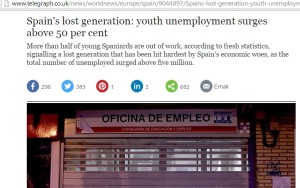“Nice haircut, Frau B!”
She pats the sides of her head, self-conscious and pleased. “Like it? You’re the only one who bothers to notice.”
There’s a knock on the door. A young woman, slight and dark-haired, sporting a pale green uniform, walks in.
“Julia!” says Frau B. “Now you can finally meet Katechen, my little Iren.”
Julia and I greet each other.
“Julia comes from Spain,” says Frau B. “Don’t you?”
“Yes, ” says Julia and hands us both a cup of coffee.
“She speaks very good German,” Frau B says after she’s left. “She came here because there were no jobs at home. Just like you did!”
We talk about mass unemployment and the effect it has on the political landscape of Europe. Frau B was a child when Germany was in its deepest ever financial crisis.
“1929 and 1930 were the worst years,” she says. Even my father was unemployed for nine months. People said that if he had no work, it meant there really was none.”
“What did he do?”
“He was a precision mechanic. He was very good with his hands.”
“Something you inherited!”
“I sure did. I got his feet too. He had tiny feet, for a man.”
She takes a sip of coffee and continues:
“Hitler would never have come to power were it not for unemployment. See, he re-built the army and got people back to work.”
I tell her about Ireland’s Republican party, Sinn Féín, and how they’re currently enjoying a rise in popularity.
We agree that mass unemployment and disillusionment add to the allure of extremism.
Sometime later, when we are done talking about politics, Frau B mentions her grandmother who was born in 1838.
As a child, Frau B would spend long afternoons reading the Bible in her grandmother’s rural home. But it is a detail related to her Oma’s appearance rather than any biblical verse, which has stuck most in Frau B’s mind.
“My grandmother used to be bothered by a few little hairs, which sprouted above her lips. She’d tear at them with her hands until they came out,” she says.
Now Frau B notices a few hairs growing above her lips. “It comes with age,” she says. “I pluck at them when I can’t get to sleep.”
“Some people believe vanity is unique to the modern condition,” says Frau B. “It’s really not.”
As I observe Frau B rearranging her hair-do, and think about the events which led up to the horrors of World War II, I feel both comfort and unease at how relatively small our 70-year age-gap really is.



I think you and Frau B are right about the humanity that binds us across generations and centuries. Which raises an interesting literary question: Is “modernism” really about the modern condition or is it merely a modern style of writing/painting/etc to get at the eternal human condition? Marxists would pin modernist alienation to historical conditions, while existentialists would pin it to the human condition generally. I draw intellectual strength from both but probably fit neither camp exactly – too grounded in humanist values for Marx’s historical materialism, but too filled with romantic wonder to mope about with the existentialists. (Btw, I love your prose style!)
LikeLike
Tell her now before she dies that you’re going to write a book about her.
LikeLike
Not sure that’s true, but I certainly would tell her if I was planning on it!
LikeLike
Every time I read about your interactions with Frau B, I wish I could meet her. She just seems awesome. However, there’s a huge ocean in the way, so I’ll have to visit vicariously through you. 🙂
LikeLike
Never say never! If I ever get around to showing her Skype,maybe she’ll get to meet her admirers from afar online! Thanks for reading 🙂
LikeLike